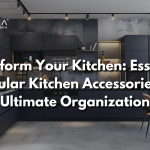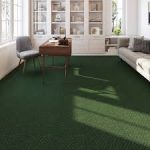A well-organized kitchen is not just about neatness; it’s about maximizing efficiency, enhancing usability, and beautifying the space. Modular kitchen accessories play a pivotal role in achieving this transformation. These accessories are designed to fit modular kitchen setups, which are becoming increasingly popular due to their flexibility and efficiency.
This comprehensive guide will delve into various types of modular kitchen accessories, exploring their materials, designs, and aesthetic options across different price ranges in rupees.
Understanding Modular Kitchen Accessories
Modular kitchen accessories are specialized elements designed to enhance the functionality and aesthetic appeal of modern kitchens. They range from drawer dividers and utensil organizers to innovative pantry units and wall fittings. These accessories are integral in creating a kitchen that not only looks great but also works efficiently for your cooking and storage needs.
Types of Modular Kitchen Accessories and Their Benefits
-
Pantry Units: These units are essential for storing groceries and bulk items. Available in various sizes, they can be tailored to fit any kitchen layout. Pantry units keep ingredients within reach and perfectly organized, making meal preparation faster and more intuitive.
-
Utensil Organizers: These are designed to neatly store and sort your cooking and eating utensils, ensuring that everything is easy to find. They come in different materials like wood, metal, and plastic, catering to various aesthetic and budgetary needs.
-
Pull-Out Baskets and Drawers: Ideal for storing pots, pans, and other large items, these accessories help utilize every inch of space efficiently. They slide out smoothly, offering excellent accessibility and visibility.
-
Corner Carousels: Utilizing corner space effectively, carousels rotate to bring items from the back of the cabinet to the front, providing easy access to otherwise hard-to-reach items.
-
Wall Fittings: Who doesn’t want everything they need at arm’s length? Working in a kitchen is all about efficiency, and things essential to everyday use should be hung on walls. Picture pots, pans, spatulas, spices, and seasonings that are easy to grab.
-
Pull-Out Pantry Units: Similar to pantry units but designed for narrow spaces, these pull-out units are extremely space-efficient, making use of the kitchen’s vertical space.
Materials and Designs
The choice of material for modular kitchen accessories can significantly affect both their cost and functionality. Common materials include:
-
Wood: Offers a classic look and durability. It’s ideal for a traditional kitchen aesthetic but can be pricier.
-
Stainless Steel: Highly durable and easy to clean, stainless steel is perfect for modern kitchens. It tends to be on the higher end of the price spectrum but offers longevity.
-
Plastic: A more affordable option, plastic organizers are lightweight and available in various colors and designs. Unfortunately, these are rarely as durable as things made from wood or metal.
Aesthetic Options and Price Ranges
Modular kitchen accessories come in various styles, from minimalist and modern to ornate and traditional, allowing them to blend seamlessly with any kitchen decor. The prices of these accessories can vary widely:
-
Entry-Level (₹500 – ₹3,000): Basic plastic and wire models that offer functional storage solutions without aesthetic embellishments.
-
Mid-Range (₹3,000 – ₹10,000): Higher quality materials like better plastics and metals, often featuring more sophisticated designs and finishes.
-
High-End (₹10,000 and above): Premium materials such as solid wood and high-grade metals with custom designs and features.
Companies like Laranza offer a wide range of premium kitchen and wardrobe hardware and accessories across India, focusing on both functionality and style.
Pros and Cons of Specific Modular Kitchen Accessories
-
Pantry Units: Pros include ample storage and better organization. The con might be the space they require, making them less ideal for very small kitchens.
-
Utensil Organizers: Pros are increased efficiency and organization. The cons can include the cost of custom solutions.
-
Pull-Out Units: Pros include better space utilization and accessibility. Cons might be the installation complexity and potential maintenance issues with sliders.
In Conclusion
Integrating the right modular kitchen accessories into your kitchen can drastically improve both its functionality and aesthetic appeal. Whether you’re building a new kitchen or upgrading an existing one, these accessories are vital components that can transform your kitchen into a highly efficient and enjoyable workspace.
Choosing wisely based on your specific needs and budget can result in a kitchen that not only looks great but also serves you well in your daily culinary adventures.
FAQ Section
Q1: What should I consider when choosing modular kitchen accessories?
A1: Consider the size of your kitchen, your storage needs, and the overall design theme. Don’t forget to consider your budget, the life of your kitchen, and how much you want to invest in it.
Q2: Are expensive modular kitchen accessories worth the investment?
A2: Typically, yes. Investing in higher-quality materials can enhance the longevity and functionality of your kitchen significantly.
Q3: Can modular kitchen accessories be customized?
A3: Many suppliers offer customization options to fit specific kitchen dimensions and personal preferences in style and material.
Q4: How do I maintain modular kitchen accessories?
A4: Regular cleaning and timely maintenance of moving parts are crucial. Following the manufacturer’s instructions to the letter is always a good rule of thumb.
Q5: Where can I find high-quality modular kitchen accessories?
A5: Look for reputable manufacturers and retailers who specialize in kitchen designs, such as Laranza in India, which offers a range of high-quality options.











